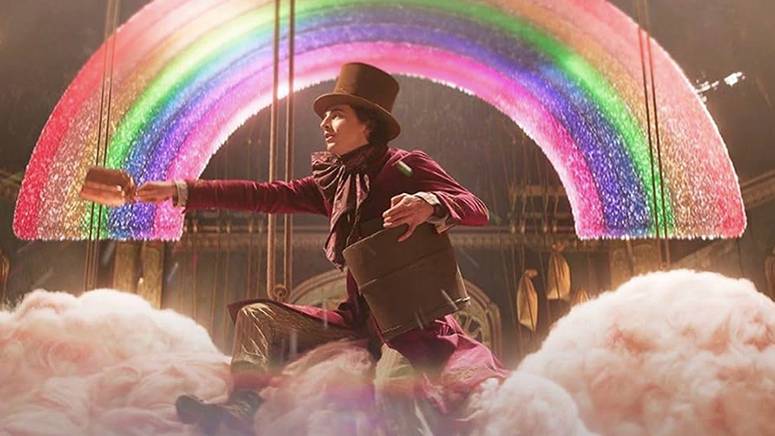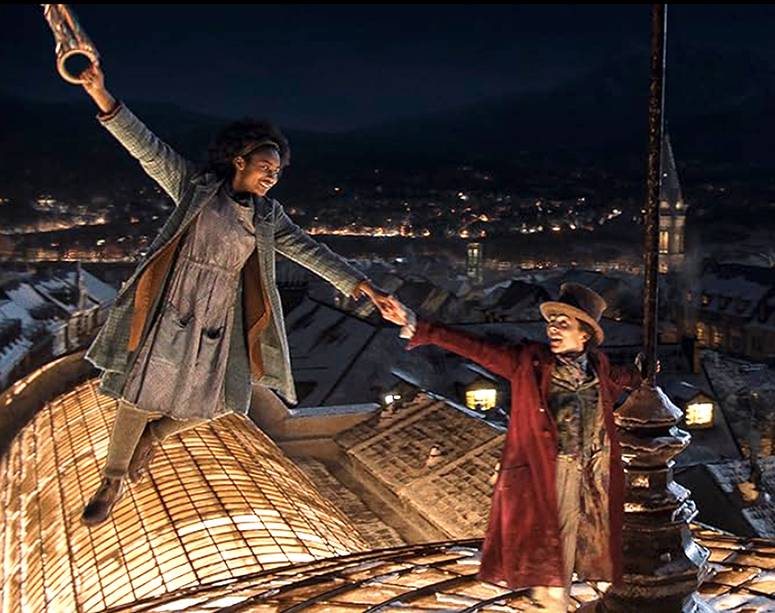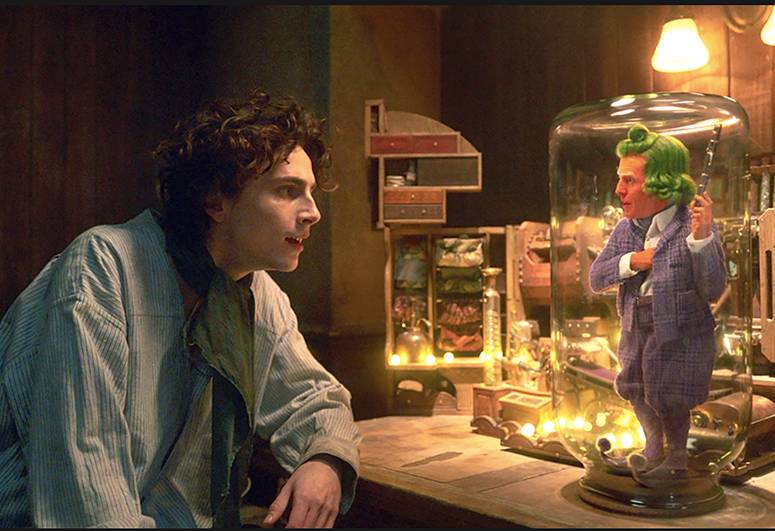A Christmas confection from the Wonka factory
Let’s be honest: There’s never been an adaptation of Roald Dahl’s Charlie and the Chocolate Factory that has made everybody happy.
Not even the original 1971 screen adaptation pleased every palate. Dahl was hired to adapt his children’s book, but dropped out of the Mel Stuart-directed project due to “creative differences.” Gene Wilder’s character—driven by an enigmatic, edgy performance—was given greater prominence in the film than Charlie. The Oompa-Loompas were shrouded in controversy. Turns out the original Dahl book described them as dark-skinned pygmies, which made their “importation” to churn out chocolate in a white man’s factory problematic, if not smacking of outright slavery. Thus the need for orange-skinned, green-haired Oompa-Loompas. (Hey, it was the psychedelic ‘70s.)
Now comes Wonka, an origin story for the chocolatier, starring Timothée Chalamet and directed by Paul King, known for his family-friendly Paddington movies.

Saccharine is the word that comes to mind. Bathed in the cuddlesome warmth of stuffed animatronic teddy bears selling fabric softener, Chalamet’s Wonka arrives in an unnamed European city in an unspecified time to spin his chocolate dreams; instead, he’s almost instantly held captive as an indentured servant along with other suckers in a basement laundry by Scrubbit (Olivia Colman) and Bleacher (Tom Davis) until they work off their debts.
There, the aspiring chocolate magician encounters Noodle (Calah Lane from This is Us) who’s converted to the magical nature of Wonka’s chocolates.
The script does dip into source material in ways other adaptations didn’t. Here, for example, Slugworth (Paterson Joseph) is restored as the chocolate rival he was in the Dahl book — not the corporate spy employed by Wilder’s Wonka in the 1971 movie.
Wonka has a back story, of course. His mom (Sally Hawkins) taught Willy to love her chocolate bars (secret ingredient: love), though she never got around to teaching him how to read. That’s okay, it gives Noodle the chance to teach him the basics while stuck in their basement prison.

The script does dip into source material in ways other adaptations didn’t. Here, for example, Slugworth (Paterson Joseph) is restored as the chocolate rival he was in the Dahl book—not the corporate spy employed by Wilder’s Wonka in the 1971 movie.
But while the newfound origin story is sketchy here (something about chocolate = love), there is something else lacking in Wonka’s revisionism. The chocolate maker known for his profound indifference to the plight of overindulged children in the 1971 version? Gone. You won’t be able to trace any connection from Chalamet’s sleepy-eyed, if cheery, young Wonka to the cynical misanthrope as portrayed by Wilder. Perhaps some supremely nasty sh*t has yet to happen in young Wonka’s life (maybe sequels to come?) that will explain his emergence as a snide candy man who will blithely allow Augustus Gloop to go gurgling down a chocolate river and serenely watch as Violet Beauregarde blows up into a huge blueberry and is rolled out of the factory by her parents.
In short, every nasty edge has been carefully buffed away from this prequel. And it doesn’t exactly do justice to Dahl’s original 1964 novel, which was loaded with savage screeds against permissive parenting. (Dahl apparently envisioned even more Golden Ticket winners for Wonka to punish in early draft chapters.)

But Wonka is what it is. So what is it? It’s not quite the right fit for really young children, and teens will probably find it a little too goody-goody. (Though the casting of Chalamet is clearly aimed at a teen fan demographic.)
There is the matter of the music, with new songs penned by Neil Hannon of chamber pop group The Divine Comedy. None of these songs will linger much in your memory after Pure Imagination and Oompa Loompa have been served up in the credits. (It’s actually remarkable how the original Anthony Newley tunes have managed to cross over into pop culture from generation to generation.)
And speaking of Oompa Loompas, the man who manages to steal this show out from under Chalamet and the rest is Hugh Grant as an aggrieved orange-faced man (no, not that orange-faced man) who has been stalking young Wonka for years after the aspiring chocolate maker plundered his country’s last cocoa beans. Grant’s pint-sized Oompa Loompa is first rate, as is Rowan Atkinson playing a choco-addicted priest who is in cahoots to hide a river of milk chocolate below his cathedral. There should be more of their insouciance and insolence in this project.
To be fair, there are moments of inspiration in Wonka, such as the giraffe-milking sequence, and the (short-lived) chocolate factory itself, and the tangled web that somehow leads Bleacher and Scrubbit to start snogging. And very importantly, the appearance of candy and chocolate does spark joy here. There’s a good heart behind this outing, and as I said, a warm and fuzzy vibe that is either meant to make you scratch-and-reverse your memories of previous filmed Wonkas (looking at you, Johnny Depp in the Tim Burton version), or intended to clean up the whole franchise beyond recognition into something that’s politically correct, adorable and about as relevant to real life as a Build-A-Bear souvenir from a seaside arcade.
* * *
Wonka opened in Philippine cinemas on Dec. 6, released through Warner Bros. Pictures.


